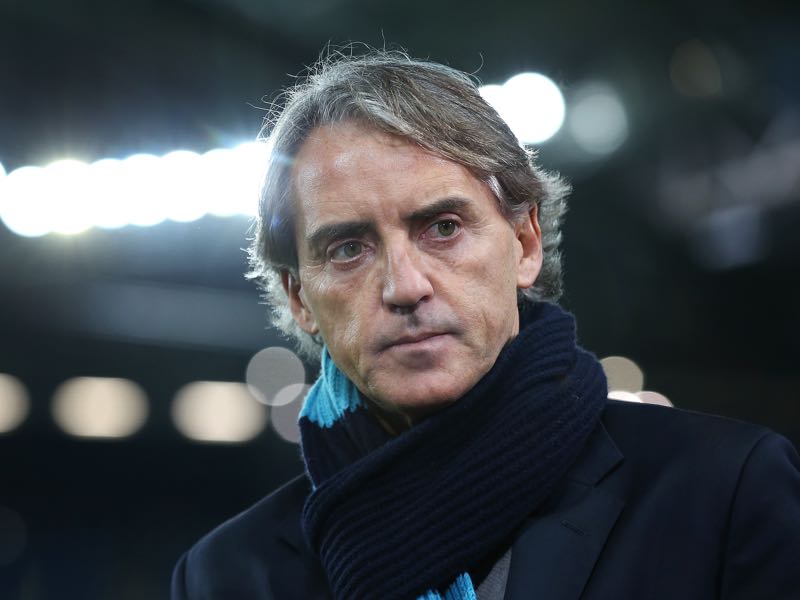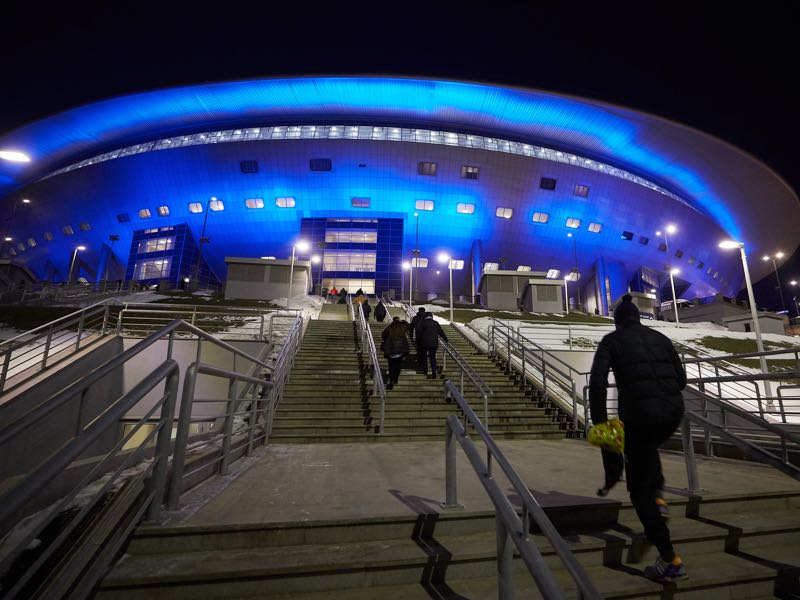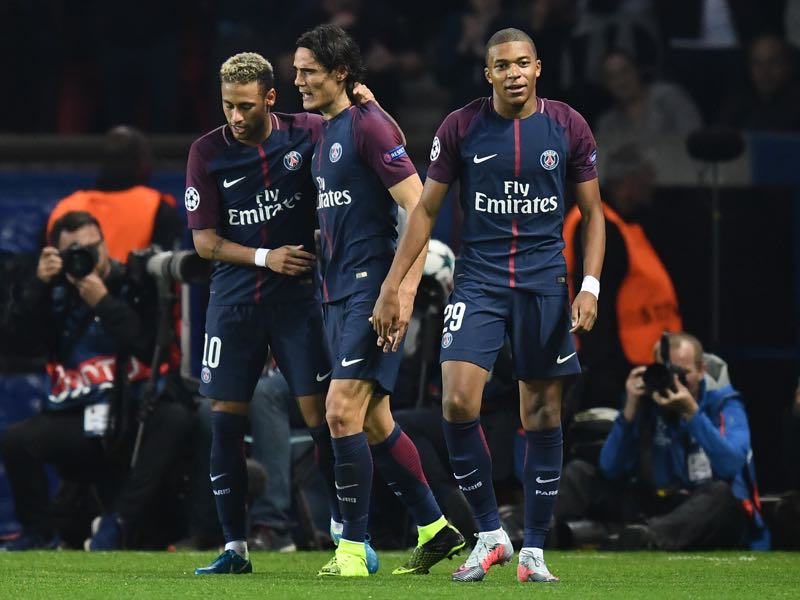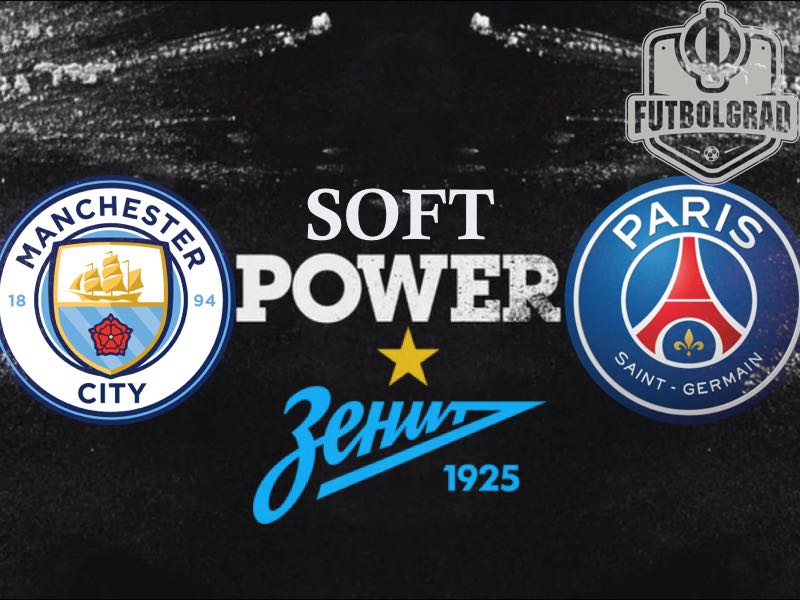Manuel Veth –
Like Manchester City and Paris Saint-Germain, Zenit Saint Petersburg are a club owned by a state-institution and are a symbol of soft-power. Like Paris Saint-Germain Zenit’s ambitions are now under threat at an early point of the season suggesting that although well-financed government owned clubs owned as soft-power tools do not necessarily provide the best environment for success.
It was a day to forget for Zenit Saint Petersburg. Not only was Zenit eliminated from the UEFA Europa League by RB Leipzig, but the club coached by Roberto Mancini also lost star striker Aleksandr Kokorin to an ACL injury – the striker now becomes the third Russian national team player in recent weeks to miss the World Cup with a knee injury.
While on a personal level Kokorin’s injury is bitter – Zenit will now also have to look to rebound in the league to salvage a season that has been derailed since the winter break. Starting with much enthusiasm and dominance in the Russian Football Premier League the club has struggled since the fall, and the crisis has gone from bad to worse with just one victory in all competitive matches – a 3-0 win against Celtic in the Europa League.
Now after matchday 22 Zenit have slipped to fifth place in the Russian Football Premier League standings and although the gap to the Champions League spots is just two points first placed Lokomotiv is now ten points ahead of the Gazprom owned club. Altogether the season is, therefore, a disappointment given that Roberto Mancini was allowed to invest €94.3 million in new players this season.
Zenit’s investment is a fraction of the investments conducted by Paris Saint-Germain
The investment is a fraction of the astronomic sums paid by Paris Saint-Germain and Manchester City in recent years. At the same time, however, there are parallels between France’s mega-club and Gazprom owned Zenit Saint Petersburg.
Like Paris Saint-Germain and Manchester City, Zenit are owned by a state-owned corporation. In the case of Paris that owner is Qatar Sports Investment, which has made investments in sport around the world and on top of owning PSG also owns the beIN sports network and has sponsored FC Barcelona in the past. Manchester City in the meantime are owned by the Abu Dhabi based United Group that alongside Manchester City also holds the Major League Soccer club New York City FC, the A-League club Melbourne City and the La Liga side Girona.
Zenit, in turn, is owned by Gazprom, which is one of the world’s largest oil and gas companies owned by the Russian government. Gazprom also sponsors the Bundesliga side Schalke 04, the Premier League side Chelsea and international competitions like the Champions League and the World Cup.
The parallels do not stop there. When PSG bought Neymar this summer for €222 million the transfer was often viewed as a political response by the Qatari government for the economic sanctions issued on Qatar by its neighbours on the Arabian Peninsula. Buying one of the world’s most famous footballers for a record deal – a transfer that was quickly followed with PSG signing Kylian Mbappé for €180 million – Qatar demonstrated that it had the economic power to push through a mega-deal even in a time when it was under pressure by its neighbours.

Roberto Mancini was given a significant budget by Zenit’s bosses ahead of the season. (Photo by Ronny Hartmann/Bongarts/Getty Images)
Once again there are parallels between PSG and Zenit. Like PSG Zenit are a conduit of Russian soft-power both inwards and outwards. The last couple seasons were a great example of that. Made famous for the high-profile signings of Axel Witsel and Hulk Zenit went on austerity measures in a sense reflecting the Russian government’s response to economic sanctions imposed by the West following Russia’s involvement in Ukraine and Syria.
Zenit signed Mircea Lucescu ahead of last season and were relatively austere on the transfer market signing both Hulk and Axel Witsel. The idea was that the club would undergo new self-sustainable strategy signing players that could be sold on with a profit and talents from the academy.
In recent months Vladimir Putin’s government has not only managed to stabilise the economy but instead managed to turn around the Russian economy, which is seeing real signs of growth. With this in mind, it explains why Zenit after only one, rather mediocre season, overturned their policy and returned to a direction where they would target big name transfer targets and hire Italian head coach Roberto Mancini.
After all not only was Russia’s economy improving – thanks in large parts to an increase in commodity prices directly affecting Zenit’s owner Gazprom – but Russia are also going to host the 2018 FIFA World Cup this summer. Saint Petersburg are playing at the beautiful new Krestovsky Stadium. The facility will be a key venue this summer hosting among others a semifinal and the match for third place.

Zenit have done well to fill the beautiful Krestovsky Stadium. (Photo by Oleg Nikishin/Bongarts/Getty Images)
By some accounts, the most expensive football specific stadium ever constructed the Krestovsky Stadium was one of the most controversial construction projects ahead of this summer’s World Cup. For Zenit, the city of Saint Petersburg and the Russian government filling the stadium ahead of the World Cup and following the tournament was therefore of primary concern to disperse myths of the facility potentially becoming a white elephant.
As a result, money was made available to make Zenit competitive again signing an army of Argentine stars and several Russian national team players to create an attractive product. The strategy worked at least on the stands where Zenit have done very well to fill the Krestovsky Stadium with an average attendance of 44,275 – the full-capacity for domestic games is 58,000 – which makes Zenit the team with the best average attendance in the Russian Football Premier League.
Soft-power clubs lack consistency
On the pitch, however, the meltdown now seems complete with Zenit’s exit in the Europa League. Europe was the most critical stage for Zenit and owner Gazprom. Like Paris Saint-Germain in the Champions League Zenit grave European success and often justifies its expenditures by wanting to represent Saint Petersburg and to an extension Russia in Europe.
The problem, however, has been inconsistency in strategy. Roberto Mancini will be likely gone after this season making him the latest high-profile coach to depart. Mancini has been linked with the Italy job and is unlikely to survive at Zenit should the club miss qualification to the Champions League again.

Paris Saint-Germain have brought in superstars like Neymar (l.), Edinson Cavani (c.) and Kylian Mbappe and were still eliminated in the round of 16 of the Champions League. (FRANCK FIFE/AFP/Getty Images)
With his departure will likely come a new strategy and new players – signing the many Argentine players was after all Mancini’s idea, as he believed that they are uniquely adapted to play in Russian football. On the surface, this is another example that short-term success cannot be bought.
State-owned clubs are much more than just being built for short-term success as Zenit, Paris Saint-Germain and Manchester City are advertisement platforms for Gazprom, Qatar and the United Arab Emirates. They are soft-power tools to be used to transport a positive image to the world about countries that regularly receive positive press.
As soft-power tools, however, they are supposed to reflect economic power, glitz and glamour as well as success. But that success cannot be artificially built in the short-term. Zenit’s most significant success, in fact, came when the club won the 2008 UEFA Cup with a squad that by and large was made up of regional players and had been forged together over several years.
Long-term success, therefore, comes with consistency and whether a soft-power state-owned advertisement tool club can achieve that remains to be seen. For Zenit and Paris Saint-Germain, the answer this year is no; and when it comes to Manchester City, the judgement is still out.
Manuel Veth is the owner and Editor in Chief of the Futbolgrad Network. He also works as a freelance journalist and among others works for the Bundesliga and Pro Soccer USA. He holds a Doctorate of Philosophy in History from King’s College London, and his thesis is titled: “Selling the People’s Game: Football’s transition from Communism to Capitalism in the Soviet Union and its Successor States,” which will be available in print soon. Originally from Munich, Manuel has lived in Amsterdam, Kyiv, Moscow, Tbilisi, London, and currently is located in Victoria BC, Canada. Follow Manuel on Twitter @ManuelVeth. Or contact him via email: manuelveth@futbolgrad.com.




















COMMENTS